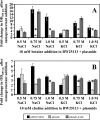Small multidrug resistance protein EmrE reduces host pH and osmotic tolerance to metabolic quaternary cation osmoprotectants
- PMID: 22942246
- PMCID: PMC3486072
- DOI: 10.1128/JB.00666-12
Small multidrug resistance protein EmrE reduces host pH and osmotic tolerance to metabolic quaternary cation osmoprotectants
Abstract
The small multidrug resistance (SMR) transporter protein EmrE in Escherichia coli is known to confer resistance to toxic antiseptics classified as quaternary cation compounds (QCCs). Naturally derived QCCs synthesized during metabolic activities often act as osmoprotectants, such as betaine and choline, and participate in osmotic homoestasis. The goal of this study was to determine if EmrE proteins transport biological QCC-based osmoprotectants. Plasmid-encoded copies of E. coli emrE and the inactive variant emrE-E14C (emrE with the E → C change at position 14) were expressed in various E. coli strains grown in either rich or minimal media at various pHs (5 to 9) and under hypersaline (0.5 to 1.0 M NaCl and KCl) conditions to identify changes in growth phenotypes induced by osmoprotectant transport. The results demonstrated that emrE expression reduced pH tolerance of E. coli strains at or above neutral pH and when grown in hypersaline media at or above NaCl or KCl concentrations of 0.75 M. Hypersaline growth conditions were used to screen QCC osmoprotectants betaine, choline, l-carnitine, l-lysine, l-proline, and l-arginine. The study identified that betaine and choline are natural QCC substrates of EmrE.
Figures





References
-
- Bay DC, Rommens KL, Turner RJ. 2008. Small multidrug resistance proteins: a multidrug transporter family that continues to grow. Biochim. Biophys. Acta 1778: 1814– 1838 - PubMed
Publication types
MeSH terms
Substances
LinkOut - more resources
Full Text Sources
Molecular Biology Databases
Research Materials

